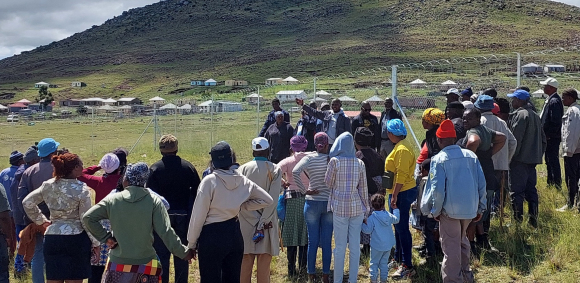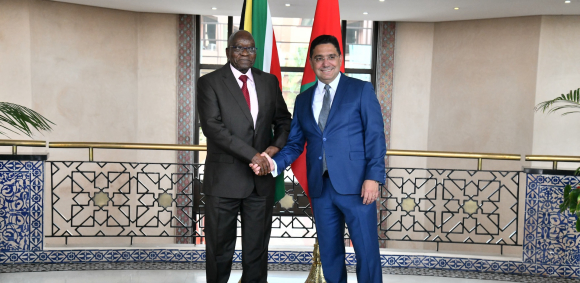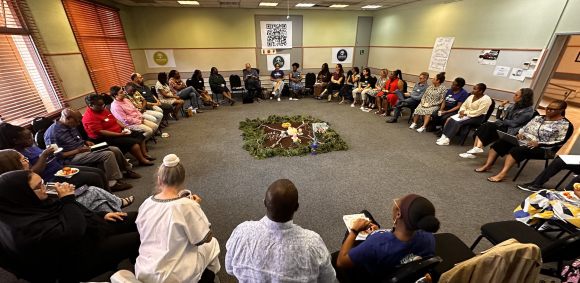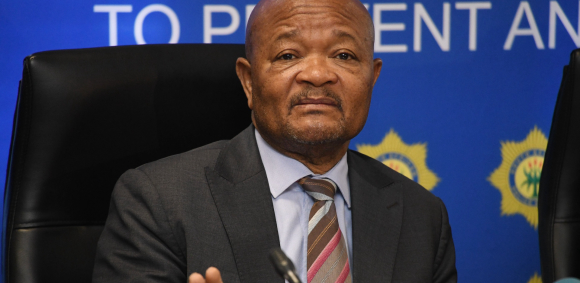AU Darfur Panel Report: Will Justice for some and political reform for others suffice for Sudan?
Under the auspices of an African solution to the intractable Darfur conflict, with the African Union (AU) preparing to take on a more robust role in monitoring Sudan’s future, lurks the reality of a half-cast proposition of justice and reconciliation.
Published on 13 November 2009 in ISS Today

Paula Roque, researcher, African Security Analysis Programme, ISS Pretoria
Under the auspices of an African solution to the intractable Darfur conflict, with the African Union (AU) preparing to take on a more robust role in monitoring Sudan’s future, lurks the reality of a half-cast proposition of justice and reconciliation. While the AU Panel on Darfur (AUPD) presents a remarkable roadmap for the stabilization of Darfur and a comprehensive package of transitional justice mechanisms, it prescribes a national political solution and confines justice to only one region of Sudan. If, as the report states, the greater problem of Sudan relates to the State and policies resulting from narrow elite interests, which has catalyzed conflicts all over the country, then justice and peace cannot be negotiated bilaterally as was done in the South, East and Darfur. Pursuing justice, reconciliation and peace is a transformational process that should not be attempted in a piecemeal fashion, but in a holistic manner within a national framework.
This is a much needed debate as Sudan’s political storm is growing and will gain further momentum with two major events, perhaps bringing to a climax the political developments since independence. On the horizon are national elections in April 2010 and the self-determination referendum for the South in January 2011. It is in this highly tense context that the AU panel report - mandated to evaluate the Darfur crisis and propose a set of solutions to address the issues of justice, peace and reconciliation in Sudan’s western region – is being received in the country.
Within the current context several are the challenges towards the implementation of the AUDP report recommendations, the most immediate one relating to the issue of timing. If there is an attempt to implement the AUDP before the elections then only 4 months remain; after the elections there will be a new ruling composition to negotiate with and if results are accepted and the process successful all national attention will be turned towards the referendum in January 2011. After the referendum the country could be facing its biggest crisis yet and attempts to stabilize Darfur may fail with other events catalyzing problematic developments in the entire country.
While the establishment of a Global Political Agreement is fundamental for any long-term stability in Darfur, the peace process will face many difficulties, including the fragmentation of the rebel groups and absence of well-formulated negotiating positions. The roadmap proposed by the AUDP towards a framework agreement will mean addressing the needs, values and interests expressed by the rebels, civil society, the IDP and refugee population, and other stakeholders. However, if the GPA results in a power-sharing agreement then this could contradict the process of competitive democratic elections of April next year.
One of the main recommendations of the AUDP report is the establishment of a Truth and Reconciliation Commission, which will prove to be just as problematic as many judicial proceedings given the lack of institutions, leadership, and accepted narratives at a national level. The objective of a truth commission is to get as much as possible a record of people’s perceptions, stories, myths, and experiences throughout the years of conflict aimed at creating a national record of the past to counter any process of state denial or historical distortions. This is especially problematic in identity conflicts, and is especially difficult in a country like Sudan that still faces a national identity crisis and the polarization of identities that has led to contrasting visions of what Sudan should look like. In addition, the commission’s findings could also provide for evidence to be used against potential perpetrators in criminal proceedings.
An important aspect of the integrated justice package are traditional justice mechanisms for Darfur, which could take the form of the Judiyya that is facilitated by elders and reparations are paid through blood money. However, dealing with certain crimes, especially those related to sexual violence, at a local level is not ideal. In addition, many of these traditional structures have been tainted and manipulated by years of brutal conflict, through cooptation and politicization, which would make the impartiality and credibility questionable.
The quest for justice among displaced and destitute communities comes in many forms , but one main requisite is social and economic justice. This recommendation is very important but it would have to be tied to a return and resettlement process, to land security and legislation, and to the disarmament and stabilization of all areas. These are prerequisites for any process that would work towards social improvements and more sustainable livelihoods.
However, the most problematic recommendations relate to the need for Legal Reform and the establishment of a Hybrid Court that would allow non-nationals to participate in the judicial process. However, without the adoption of necessary legislation to allow for foreign judges then the creation of a hybrid tribunal becomes impossible. Equally, without the reform of certain laws and the removal of immunities (as stated in the National Security Forces Act) prosecuting individuals in the armed forces is equally difficult.
While the Comprehensive Peace Agreement (CPA) of 2005 initiated the transformation of Sudan, with remarkable challenges being overcome by the National Congress Party and the Sudan People’s Liberation Movement, the country is still facing an uncertain future. Discussions for post-referendum arrangements are only beginning even as attempts to make unity have all but been abandoned. In the remaining 16 months of the CPA, the Sudanese leadership needs to proceed with moderation, and the belief in the possibility of a peaceful, negotiated and consensual outcome in January 2011. However, this will not be enough. Sudan needs more time for the transformation to occur, internally or as two separate sovereign entities, with a second transition being an option. Within this second stage of transformation Sudan’s future will depend not only on lessons from the past but on how it chooses to address and deal with the past.




